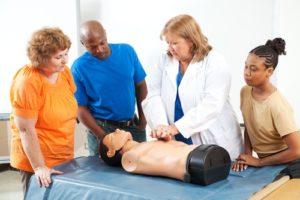In an emergency, we all know to call 911. But what if, instead of standing by idly, completely unable to help while waiting for the ambulance to arrive, you were able to administer critical assistance? What if you were able to save a life?
That’s what CPR, or cardiopulmonary resuscitation, is all about. The horrifying truth is that 92 percent of people in cardiac arrest will die before they even reach the hospital. Literally every second counts, and the 3-5 minutes that lapse between calling 911 and the arrival of emergency medical personnel can be the difference between life and death.
Indeed, the American Red Cross states that CPR can double or even triple someone’s chance of survival. You read that right: double or triple! Unfortunately, the American Heart Association (AHA) reports that only 32 percent of cardiac arrest victims get CPR from a bystander. The takeaway: You – yes, you – have it within your power to save lives. All you need is some CPR know-how.
Getting CPR Certified
Once you’ve decided to get CPR certified, the next step is to look for the nearest class. Thankfully, CPR Certification courses are common across the country; the American Heart Association’s Find a CPR Course search will help you locate one near you.
Most CPR certification courses take about 4-5 hours and run $30-$75. Ask around, though; you may be able to find discounted rates at the local YMCA, Red Cross, or other associations.
And remember to keep your certification up-to-date! (Typical CPR renewal rates are every 1-3 years.)
How Does the Good Samaritan Law Work?
Of course, CPR certification is worthless if you’re too uneasy to use it. After all, it’s no secret that our society is litigation-happy; likewise, it’s also unsurprising that the CPR-certified are often concerned about legal liability and other repercussions. So here’s the deal: All 50 states have a “Good Samaritan” law on the books, designed to protect you from legal consequences of your life-saving actions.
First things first – how does the law define a good Samaritan? Laws vary by state, but generally speaking a good Samaritan is:
- Not a medical professional or emergency rescue worker;
- Does not expect monetary compensation for services rendered;
- Is acting selflessly and voluntarily;
- Does not act willfully negligent or reckless in giving CPR; and
• The victim does not refuse assistance. (In this case, call 911 immediately and wait for assistance from emergency personnel.)
Note that there are addendums to each of these points. For example, if you accept money after the fact, even if you administered CPR with no expectation of monetary reward, the Good Samaritan laws in your state may no longer protect you. The key is to provide selfless, voluntary assistance and to refuse any offered compensation.
Go forth and save lives, good Samaritans. Check out below how My Alarm Center went through CPR training.
It’s National CPR and AED Awareness Week. Get involved with local communitygroups and sign up for classes that offer…
Posted by My Alarm Center Security System Supplier on Monday, June 1, 2015

